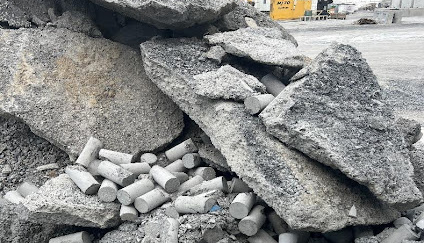Achieving Sustainability in Construction: The Role of Sensytec’s Concrete Sensors
Developer
July 3, 2024

The Need for Sustainability in Construction
Sustainability is no longer just a buzzword in construction; it’s a necessary strategy for reducing environmental impact and ensuring resource efficiency. Sensytec’s concrete sensors are revolutionizing the industry by enabling more sustainable construction practices. Traditional concrete testing methods generate massive amounts of waste during production and after. The picture above shows a mountain of waste concrete resulting from just one week of operations, where concrete specimens are cast and discarded after testing.
The construction industry is one of the largest consumers of cement, which significantly impacts the environment. From high levels of CO2 emissions to extensive waste production, traditional construction methods can be unsustainable. As the world moves towards greener practices, integrating technology that supports environmental sustainability has become crucial.
How Sensytec’s Sensors Promote Sustainability
Sensytec’s sensors are designed with the environment in mind, offering solutions that enhance sustainability through various features:
- Material Optimization: By providing accurate real-time data on concrete curing Temperature and strength, Sensytec’s sensors helps optmize cement usage, reducing waste and minimizing the environmental footprint of construction projects.
- Waste Reduction: Unlike traditional destructive testing, which requires casting and breaking concrete specimens, SensyRoc sensors can be embedded directly in the structure or element, eliminating the need for cylinder break testing.
- Reducing Carbon Emissions: With more precise data, construction projects can avoid unnecessary rework and excess use of materials, significantly cutting down on the carbon emissions associated with these activities.
Benefits of Concrete Sensors
Adopting Sensytec’s sensors in construction projects offers numerous benefits:
- Enhanced Resource Efficiency: Optimizing the use of materials and energy leads to more efficient construction practices, which in turn conserves resources and reduces costs.
- Compliance with Green Building Standards: Using these sensors helps projects comply with various green building standards and certifications, making them more attractive to clients who value sustainability.
- Improved Project Sustainability Profile: Incorporating eco-friendly technology enhances the sustainability profile of construction projects, which is increasingly important to stakeholders and investors.
Applications in Green Building Initiatives
Sensytec’s sensors are particularly beneficial in projects aiming for LEED certification or other green building standards. By providing detailed insights into the materials’ performance and environmental impact, these sensors support the construction of buildings that are not only structurally sound but also environmentally responsible.
Conclusion
The role of Sensytec’s concrete sensors in achieving sustainability in construction cannot be overstated. As the industry evolves, the adoption of such innovative technologies will be crucial in building a more sustainable future. By leveraging Sensytec’s sensors, construction projects can reduce their environmental impact while enhancing efficiency and compliance with global sustainability standards. This not only benefits the planet but also boosts the economic viability and public perception of construction projects.

